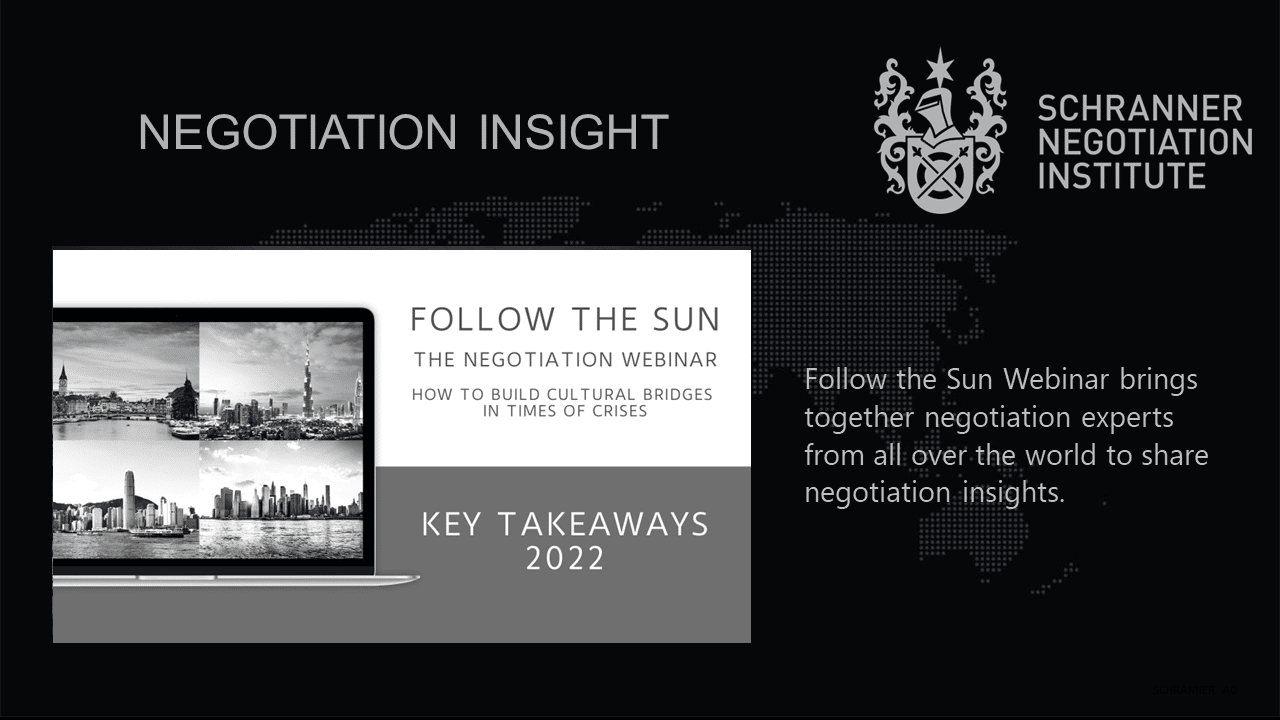FOLLOW THE SUN WEBINAR 2022: KEY TAKEAWAYS
The theme of “Follow the Sun” 2022 was “How to build cultural bridges in times of crisis?”.
Follow the Sun Webinar brings together negotiation experts from all over the world to share negotiation insights. The focus of the Follow the Sun webinar 2022 was on how to build cultural bridges in times of crisis.
As we are facing difficult times in terms of economic, social, and environmental concerns, we believe it has never been more important to learn about how to collaborate in the most effective way.
Together with negotiation experts from Singapore, China, the UAE, Switzerland, and the U.S., we discussed, among other topics, important aspects when dealing with different cultures. This insight highlights some of the key takeaways of each session.
SINGAPORE WITH MING MAA
In our first session from Singapore, Ming Maa, president of Grab, shared some important insights on
negotiating with business partners from Asia.
• In Asia, especially in Japan, negotiations are focused on underlying principles. Whereas in
countries such as the U.S, relationships can be built upon competencies and skills, the focus in
Asia tends to be more on partnerships and trust in business partners. Therefore, you have to be
aware of setting the right principles at first as this can save a lot of misunderstandings.
• To successfully negotiate in Asia, patience, and empathy as well as the recognition and appreciation of the partnership with the opposing side are crucial.
• Important principle: “You need to make sure that you are not only a fair-weather friend but a friend who is there in all kinds of weather.”
CHINA WITH JOSEF MONDL
In our China session, Josef Mondl, director of the China Competence Center at the University of St.
Gallen, explained the importance of time, strategy, and network when doing business in China.
• According to Josef, the Western perception of China has changed very little in the past decades. To
negotiate successfully we, therefore, need to change our awareness fundamentally. Approaching
China without a predefined perception is key to succeed in business and negotiation.
• Important insights on the business culture in China:
1. Right timing: It’s all about finding the right time. Knowing and being aware of the right moment
is key.
2. Strategic business model advantage: It is essential to have a strategic business model and to
really know which problem you are solving in the competitive Chinese market.
3. Solid network: Invest resources when it comes to people and relationships without any ulterior
motives.
UNITED ARAB EMIRATES WITH SIMON RAHIMZADA
In our third session from the United Arab Emirates, Simon Rahimzada, Partner at King & Spalding,
highlighted the importance of the personal approach in negotiations.
• In the Middle East, negotiations are approached in a much more “playful” manner. People like to
do business and look forward to negotiations. However, it is essential to approach negotiations
respectfully and to anticipate the cultural components of business partners in order to be
successful.
• Express your empathy and understand the cultural nuances of the region you are negotiating in,
as entering into discussions without this understanding will hinder the process. For example, in
the Middle East it is not uncommon to meet business partners for a late-night meeting.
• Focus on the period prior to the negotiation and invest time to get to know the other party. As it is
a common practice to meet with the involved business partners in advance, take into account that
the negotiation process consumes a certain amount of time.
SWITZERLAND WITH MATTHIAS SCHRANNER
In our Switzerland session, our founder and CEO, Matthias Schranner pointed out the risk of
missing the window of opportunity in negotiations.
• From our perspective, organizations are not fully prepared to handle crisis situations. There is a need to switch to a crisis mode since the usual strategies and tactics of daily business negotiations do not work anymore.
• Difficult negotiations need to have an underlying purpose; an emotional storyline for the greater good to complete the rational negotiation target. This purpose needs to be both credible and visible on the company’s website and has to be communicated on different social media channels.
• Never underestimate the “window of opportunity”. This window will only remain open for a short period of time, therefore, it is essential to quickly find an agreement because the window will soon close again.
U.S. WITH ANDREW KOHLRIESER
In our U.S. session, Andrew Kohlrieser, former Congressional policy advisor and legislative
correspondent, highlighted important insights into the negotiation culture of the U.S.
1. Americans love to get a deal and to win a deal: They don’t view negotiations as cooperation or
collaboration but simply as coordination, meaning that every party is responsible for their side of the deal.
2. Time is money: Americans like to solve the negotiation process extremely fast. Knowing that they want to close a deal quickly, it might be a good tactic to take the time to de-escalate because this time pressure puts the opposing side under stress.
3. Status and authority are important in the US: As status and authority play an important part in business, acknowledge and praise the other side at the beginning of a negotiation in order to build trust.
4. People love to climb the corporate ladder very fast: Use this knowledge and let the supervisor of the opposing party know about their good negotiation skills in order to build a bond.
Follow us on LinkedIn for more insights.
